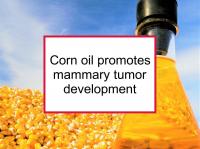Diets high in extra-virgin olive oil have been reported to prevent mammary tumor development and growth in animal models of breast cancer compared to high corn oil diets. Most of these experiments have treated corn oil as a control in contrast to olive oil (which has demonstrated chemopreventive effects).
However, corn oil itself appears to promote mammary tumor development. For example, sexual maturity has been shown to occur earlier than normal in rats fed high fat corn oil diets, in conjunction with increased body weight around puberty. Now a new study has reported that a high corn oil diet strongly stimulates mammary tumor development, in part by increasing proliferation and reducing apoptosis (programmed cell death) in mammary glands.
Linoleic acid and arachidonic acid promote breast cancer
Corn oil has high linoleic acid content. Linoleic acid is an omega-6 fatty acid which is converted into arachidonic acid in the body. Arachidonic acid and linoleic acid have both been shown to increase inflammation (a breast cancer risk factor). Arachidonic acid also has been shown to heighten aromatase activity, thus increasing circulating estrogen.
Arachidonic acid promotes cell migration, including of triple negative (ER-/PR-/HER2-) breast cancer cells. Linoleic acid induces proliferation and invasion in estrogen receptor positive (ER+) breast cancer cells. Daughter mice of female mice fed a high linoleic diet are more prone to develop mammary tumors. Several studies have reported that breast cancer patients have higher levels of omega-6 fatty acids in their breast tissue than cancer-free women. Some researchers have concluded that the protective effect of omega-3 fatty acids may result in part from suppression of arachidonic acid-specific pathways.
Latest research finds corn oil increases proliferation
The study referenced at the beginning of this news story was designed to compare the effects of high-fat corn oil and olive oil diets on mammary gland tumor development in an animal model of breast cancer. To conduct the study, the authors fed female Sprague-Dawley rats either corn oil or extra-virgin olive oil diets either from weaning or as of when they were administered a carcinogen known to induce mammary gland tumors. Mammary gland gene expression profiles and other molecular analyses were performed. Carcinogenesis parameters such as tumor size and number were assessed at days 105 and 246.
The corn oil diet was found to increase the body weight and mass of animals fed from weaning. On the other hand, the extra-virgin olive oil diet did not change these parameters. In fact, the olive oil diet increased the hepatic expression of a protein (UCP2), suggesting a decline in intake/expenditure balance. The gene expression profiles of the rat mammary glands were modified differently by the two diets after only a short dietary intervention. The corn oil diet was found to down-regulate the expression of genes related to the immune system and apoptosis, whereas the extra-virgin olive oil diet altered the expression of metabolism genes.
Additional analysis found that the high corn oil diet increased mammary gland proliferation and reduced apoptosis, which appears to be one way that the diet stimulated carcinogenesis. The authors conclude that a high corn oil diet strongly stimulates mammary tumor development, as evidenced by relevant modifications in gene expression profile and proliferation/apoptosis balance of the mammary gland.
